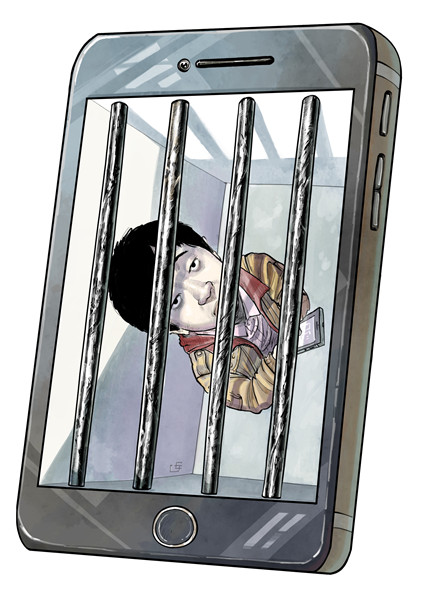Screen fiends
 |
|
CAI MENG/CHINA DAILY |
Yang Yifan is bionic. In a sense, that is. "My phone is part of my body," the 19-year-old says.
"Without it, I lose touch with the outside world."
She carries it in her hand, rather than her bag, when she goes out.
Yang begins her mornings checking social media. She grips the device the rest of the day, playing games, ordering meals and reading online novels.
And much, much more.
The Xiamen University French major says she read a book a week in high school. She reads far less since she got her smartphone in college.
Zhihu, China's equivalent of Quora, recently told Yang she'd browsed around 200,000 of its web pages last year.
"It's unbelievable! And the worst part is that I can count the books I read last year on my fingers," she says.
"My literacy is suffering. That's terrifying."
Over 695 million Chinese accessed the internet via smartphone last year, the China Internet Network Information Center reports. They accounted for over 95 percent of the country's web users.
The most frequently used app, WeChat, had 768 million daily users, its annual report says. WeChat users born in the '80s and '90s send 74 messages a day.
While smartphone technology has revolutionized the way we live-arguably, largely for the better-there's a dark side of dependency.
How much do we control these devices? And how much do they control us?
Addiction
Huazhong Agricultural University student Li Zhaojie didn't realize she was addicted until her parents complained.
The 19-year-old spent her holiday at home with her face in her phone rather than engaging her parents.
"They weren't happy," she says.
"I feel pretty guilty because I spend less time with them since college."
Li uses her cellphone in the dormitory bathroom, forcing her roommates to wait.
She knows it's dangerous to stare at the screen while walking in public but can't help herself.
She always brings a battery pack when she heads out.
"I feel hollow and lost when my battery dies," Li says.
She was shocked to discover she spends about seven hours a day on the device after downloading an app called Offtime.
Li puts her phone away, puts it on silent mode and takes other measures to cut down her screen time.
But her cravings remain potent.
She feels anxious and disappointed in herself.
"I get moody when I find I'm wasting time on my phone rather than studying," she says.
Mind games
Phone addiction can't be clinically diagnosed like dependency on drugs and alcohol.
Tsinghua University assistant professor of psychology Li Songwei says it's not even real.
"People in their 20s face a lot of pressure their predecessors didn't," he says.
"They find reasons to blame themselves for imperfections. Phone addiction becomes a scapegoat.
"Of course, people waste time on their phones. But they also waste time without their phones. Worrying about wasting time is more detrimental than the actual time wasting."
Yet there's also the risk of social disconnect.
Illustrator Hu Yunyi says her boyfriend's smartphone use is the biggest problem in their relationship.
The avid gamer owns four phones.
"He told me I'm his lover, and the phones are his beloved wives," the 23-year-old complains.
She feels ignored and disrespected. He pulls out a phone whenever they're together, whatever they're doing.
"His behavior has pushed me to re-evaluate our relationship."
Games are designed to be addictive, explains Wu Chaoran, former operations manager of the mobile role-playing game Dragonform.
"Companies use strategies like daily login rewards and social-media score-sharing to suck them in."
Convenient efficiency
While smartphones enable us to waste time, they also save it.
Users don't need to travel or line up to get goods and services-shopping, banking, ordering food and the like can be done quickly, with a few finger taps.
And mobile platforms offer greater varieties of goods and services with more affordable options.
Then, there are gray areas that exist in limbo between productivity and playfulness.
Nankai University student Zhang Xuanshuo posts random thoughts on social media to connect with friends.
"I post when I see something funny," the 22-year-old publishing and editing major says.
"I enjoy discussing social issues and sharing jokes."
Beyond that, social media enables her to access information and contact people she otherwise couldn't. She has learned terms and about books by following other social science students and academics.
"This is one of the fastest ways to dive into a new academic area," she says.
"It's also much easier and faster to learn through other people's discussions."
















